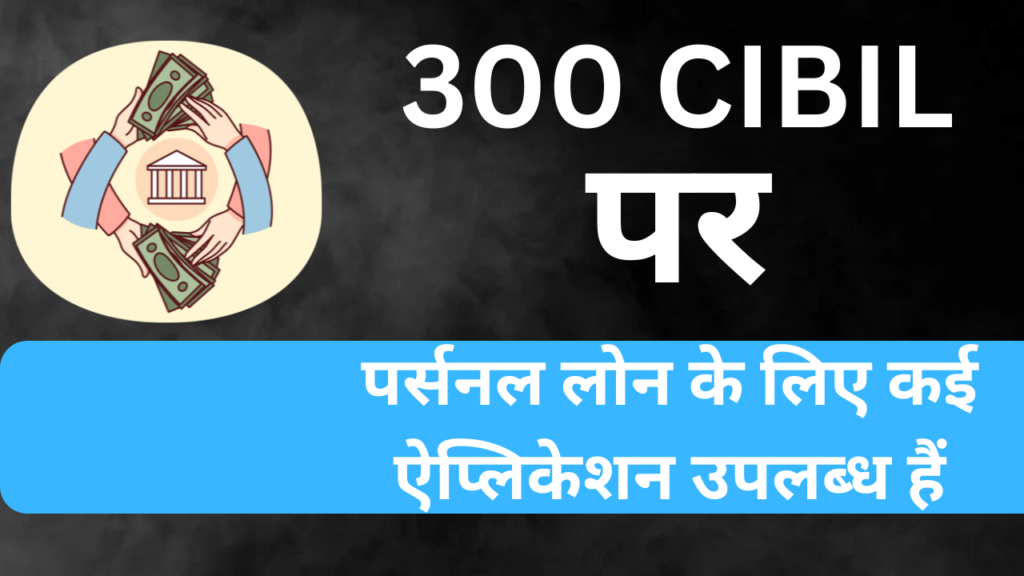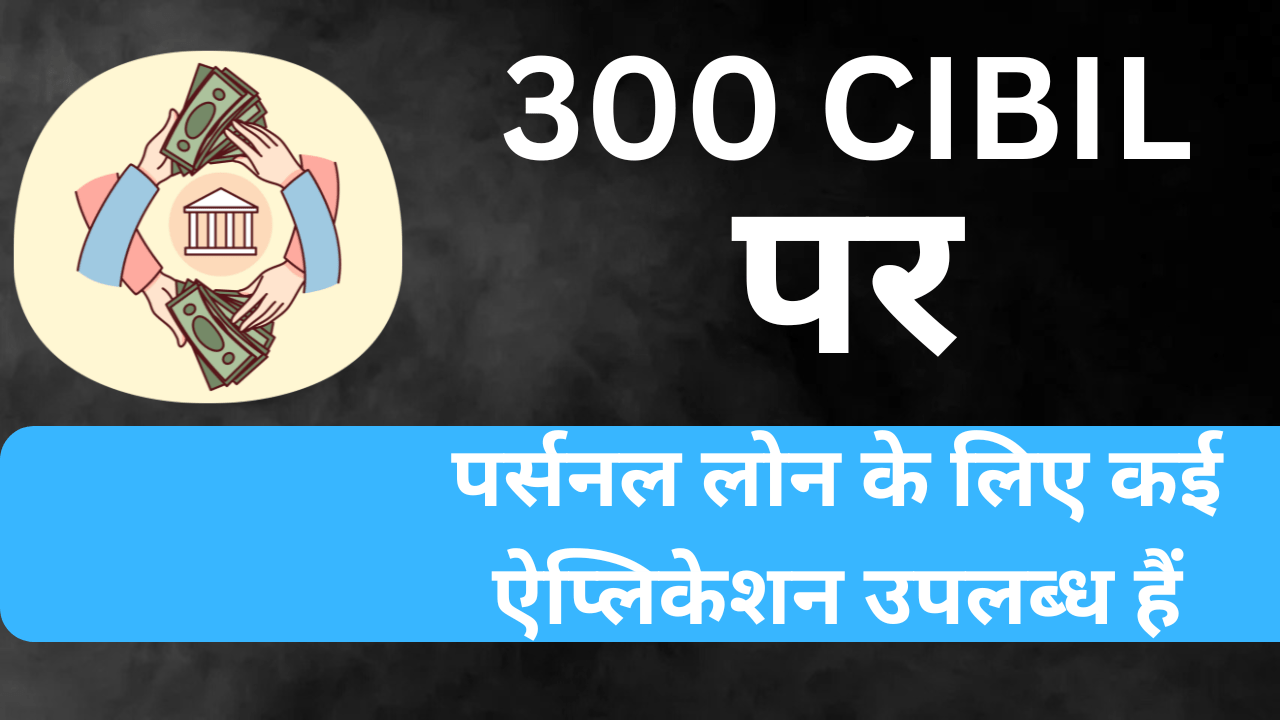In the dynamic world of personal finance, where creditworthiness often dictates access to essential funds, having a low CIBIL score can feel like a significant barrier. Traditionally, a score as low as 300—the lowest on the CIBIL scale—signifies poor credit history, often leading to loan rejections. However, the financial ecosystem is evolving, and “300 CIBIL score loan app” is a beacon of hope for individuals grappling with low credit scores. These platforms offer tailored solutions, empowering borrowers to access loans despite their less-than-ideal credit histories.
What is a CIBIL Score?
The CIBIL score, issued by TransUnion CIBIL, is a three-digit numerical representation of an individual’s creditworthiness. It ranges between 300 and 900, with higher scores indicating better credit health. Banks and financial institutions primarily rely on this score when assessing loan applications.

Score Categories.
- 750-900: Excellent – High chance of loan approval.
- 650-749: Good – Moderate chance of approval.
- 550-649: Average – Needs improvement; higher risk for lenders.
- 300-549: Poor – Low chance of approval without special interventions.
Challenges of a Low CIBIL Score
A score close to 300 is typically a result of factors like missed payments, high credit utilization, or frequent loan inquiries. The challenges faced include:
- Loan Rejections: Traditional lenders avoid high-risk borrowers.
- Higher Interest Rates: Loans, if approved, come with elevated interest rates.
- Limited Access: Options are restricted to informal or predatory lenders.
Enter 300 CIBIL Score Loan Apps
These apps redefine traditional lending norms by focusing on alternative credit assessment methods. Let’s explore their key features:
1. Flexible Credit Assessment
Loan apps catering to low CIBIL scores leverage alternative data points such as employment history, monthly income, and spending patterns. This holistic evaluation enables them to extend credit to individuals who conventional institutions might otherwise sideline.
2. Small-Ticket Loans
Many of these platforms specialize in small-ticket loans, making them accessible to borrowers seeking funds for immediate needs, like medical emergencies or bill payments.
3. Quick Disbursal
One of the significant advantages is speed. With minimal paperwork and automated processes, loans are often disbursed within 24-48 hours, addressing urgent financial needs effectively.
4. Credit-Building Opportunities
Timely repayment of loans availed through these apps helps borrowers rebuild their credit scores, paving the way for better financial prospects in the future.
Notable Loan Apps for Low CIBIL Scores
Here are some platforms known for assisting borrowers with low credit scores:
1. MoneyTap
- Features: Flexible credit lines, minimal documentation.
- Eligibility: Evaluates alternate credit factors.
- Loan Amount: ₹10,000 to ₹5,00,000.
- Interest Rates: Starting from 13% per annum.
2. FairMoney
- Features: Instant loans for low CIBIL scores.
- Eligibility: Simplified KYC process.
- Loan Amount: ₹1,000 to ₹2,00,000.
- Interest Rates: Varies based on tenure.
3. EarlySalary
- Features: Salaried individuals can avail short-term credit.
- Eligibility: Focuses on monthly income.
- Loan Amount: Up to ₹2,00,000.
- Interest Rates: Competitive.
4. Credy
- Features: Streamlined process, no prepayment charges.
- Eligibility: Looks at income stability.
- Loan Amount: ₹10,000 to ₹1,00,000.
- Interest Rates: Moderate.
Benefits of Using These Apps
1. Accessibility
Borrowers can apply from anywhere, anytime, using just a smartphone and internet connection.
2. Transparency
These platforms often provide clear terms and conditions, helping borrowers make informed decisions.
3. Empowerment
By offering a financial lifeline, these apps help users regain control of their financial health.
4. No Guarantor Needed
Unlike traditional loans, most of these apps do not require guarantors or extensive collateral.
Precautions When Using Loan Apps
While these apps can be lifesavers, borrowers should exercise caution:
- Verify Legitimacy: Only use apps registered with the Reserve Bank of India (RBI).
- Read Terms Carefully: Ensure you understand the interest rates, repayment terms, and penalties.
- Avoid Overborrowing: Borrow only what you can repay comfortably.
- Data Security: Ensure the app uses robust encryption for personal and financial data.
Case Studies: Real-Life Impact
Case Study 1: Ramesh’s Journey
Ramesh, a small business owner, faced rejection from multiple banks due to a CIBIL score of 320. Through a loan app, he secured a small-ticket loan, which he repaid diligently. Over time, his score improved to 650, enabling him to access traditional loans for business expansion.
Case Study 2: Priya’s Medical Emergency
Priya’s low credit score made it challenging to secure funds for an unexpected medical emergency. A loan app provided quick disbursal, ensuring timely treatment. This experience motivated her to manage her finances better and rebuild her credit profile.
How These Apps Contribute to Financial Inclusion
The emergence of 300 CIBIL score loan apps is a significant step toward financial inclusion. By leveraging technology and alternative data, these platforms bridge the gap between traditional financial institutions and underserved populations. They empower individuals to:
- Access Credit: Even with a poor credit history.
- Rebuild Credit Scores: Through disciplined repayment.
- Achieve Financial Independence: By breaking the cycle of reliance on informal lenders.
The Future of Low CIBIL Score Lending
The financial landscape is evolving rapidly. With advancements in artificial intelligence and machine learning, the assessment of creditworthiness is becoming more nuanced. We can anticipate the following trends:
- Improved Risk Assessment: Enhanced algorithms for evaluating non-traditional data.
- Wider Acceptance: More lenders embracing low-score borrowers.
- Regulatory Oversight: Stricter guidelines to ensure borrower protection.
Conclusion
“300 CIBIL score loan apps” are transforming the financial landscape, offering hope to those previously excluded from the formal credit system. By focusing on alternative credit metrics, speed, and convenience, these platforms not only address immediate financial needs but also contribute to long-term financial health. For borrowers, the key lies in using these tools responsibly to unlock better opportunities and secure a brighter financial future.

